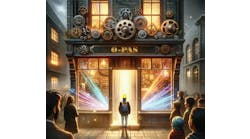By Nancy Bartels, Managing Editor
Sometimes when you listen to the veterans talk about training young engineers, you get the impression that future process-plant operators and automation engineers will be three-headed aliens. Theyre sure not like we were, say the old guys. They process information differently; they get all their information from Google; they want everything to work like PlayStation 3; theyre all about Wikis, Twitter and texting. Howre ya gonna keep em down in the control room after theyve played on a Wii?
This time, its not just the familiar, inevitable shouting over the generational divide. Process plant jobs and the way theyre done are changing. The young folks coming up to do them also are learning and working differently, and the schools that train them and the companies that hire them will have to keep up.
A Different Place
Our June story, Process Plant 2025, outlined some of the changes coming to process plantseverything from wearable HMIs to automatic noses that can suss out changes in processes via smell. Other new aspects of the plant environment include the increasing automation of basic processes and an ever-increasing torrent of data, including automatic diagnostics and performance monitoring data, that will have to be turned into usable information on the fly.
Professor Venkat Venkatasubramanian, director of the Laboratory for Intelligent Process Systems (LIPS) at Purdue University, says to expect much, much faster machines. Quite possibly parallel computers will begin to be used Networking is going to explode. Wireless sensors, such as RFIDs, are coming out of the woodwork. [There is] also tremendous power in communication technologies. What this means is, because of the processing power and technologies, you can get data from anywhere from the individual pump out into the supply chain.
The downside of all this power and data accessibility is that, for the individual operator or engineer, it will be like drinking from a fire hose, he says. Having all kinds of data is not necessarily good news. What we really want is not just raw data, but information. Beyond that, you also want to know why things are happening, i.e, knowledge and understandingand getting that is not easy. Its true that the kids coming out today are much more comfortable with technology, but that alone is not going to solve all these problems. We have to give them the tools to make real-time decisions. What they need is knowledge.
And, if that fire-hose stream of data werent enough, the globalization of the workforce means more work and information exchange will be done remotely. Some operators and engineers will control multiple sites from a single control room, which will require workers with a more global view of operations and an understanding of how their daily tasks fit into the bigger company picture.
Twenty years ago you could be a specialist in a particular segment. Today that has changed completely, says Vikas Dhole, vice president of product management at automation software vendor AspenTech. Now [engineers] are expected to know not just design, but operations, project management and economics. Employers are expecting more diversity, flexibility and multitasking ability.
Bryant Dyer, process technology instructor at Lee College, says, The role of the process technician has to change. As the control systems have gotten better, the operators have gotten closer to the engineering level of their work. [We are going to see] a much more sophisticated, computer-savvy technician who is maximizing efficiency. Technicians need to understand how important it is to minimize costs, maximize ability to produce product and make it better than anybody else. Thats their job now, and it will become more this way.
Companies are going to expect people to be able to understand the bigger picturehow what they do is related to the companys business priorities, says George Buckbee, vice president for product development at ExperTune.
Future process plant workers also can expect the mantra, do more with less, to drive operations with increasing intensity. Its not going to be just a response to a global economy in which efficiency here has to offset lower labor costs in other places. Fewer operators and engineers will be around to do the jobsnot just because companies cant or wont pay for them, but because they just arent in the job pipeline to be hired at any price.
The generation of engineers reaching retirement age now, coupled with a boom in process industries around the world is making for a real shortage of trained personnel and is leaving the schools scrambling to turn out more as quickly as possible.
Andy Van Der Veen, chairman of the instrumentation program at the Northern Alberta Institute of Technology (NAIT), says, Were increasing the number of seats [for students] by 33%, but we still get about three applications for every seat, and they can all get jobs. Its like that across the board.
A Different Breed
But providing enough operators and engineers with new skill sets isnt the only challenge. Schools and companies also are faced with a different kind of student.
We sense this change watching our own kids. They multi-task, learn video games by diving in and making mistakes, and develop entire networks of relationships via computer. We sense their shorter attention spans and their impatience with classic learning techniques such as reading the textbook.
Cling as we might to the old ways, if were honest, we can see some of these changes in ourselves. Nicholas Carr poses the question Is Google Making Us Stupid? in the July/August issue of The Atlantic. Part of his answer is this confession: Im not thinking the way I used to think. Immersing myself in a book or a lengthy article used to be easy. My mind would get caught up in the narrative . . . , and Id spend hours strolling through long stretches of prose. . . . Now my concentration often starts to drift after two or three pages. I get fidgety, lose the thread, begin looking for something else to do. . . The deep reading that used to come naturally has become a struggle.
Those teaching new engineers and operators see these changes in spades.
Students today get their information differently than we did, says Dr. Gerald Cockrell, professor of engineering technology at Indiana State University and president-elect of ISA. They want response almost immediately. They absorb information differently. They dont take notes and dont underline. They want the Cliff Notes presentationquick and to the point.
Venkatasubramanian focuses on what he calls the Google phenomenon. Students today, he says, seem to be losing the ability to think through things deeply or contemplate for a long time. Their solution is to go to Google. If the answers not there, they often dont know what to do. We may be creating a whole generation of folks who look for quick solutions. Theyre used to getting instant responses, and there may be adverse consequences to that. You need some long-term thinkers as well.
Lee Colleges Dyer sees the same effect on his students. What were seeing and fighting is the direct result of the educational system and the onslaught of Google and Wikipedia. [Students] think knowledge is disposable. Why do you need to learn the theory or memorize facts when you can just look it up on Google?
The problem with that, he adds, is that knowledge is not disposable in our industry. If you dont have the knowledge in your head, theres no time to look it up when the process is going bad. I tell students that there are certain things that, if you dont remember them, that lack will make you less efficient and less safe.
However, if the Google phenomenon has created a different breed of learners and presented us with a different set of challenges, theres no going back. The Internet horseand all it implieshas left the barn. The challenge for schools and companies alike is to catch it.
The New Engineering School
This new breed of student also has fostered some striking changes in the way engineering is taught.
Venkatasubramanian says students will still have to go through the fundamentals of math, physics, chemistry and biology, so they understand whats going on, but the courses will change a lotin organization, content, format, and delivery.
They already have in many respects. Cockrell says hes old-fashioned in the sense that he still requires a textbook. Many people just put all this stuff online. The textbook as we know it will probably be something thats on a computer. According to Forbes, by 2019 there will be more online coursework than traditional lectures. Now with the technology, high-speed Internet, simulation and the other things, Im able to do online discussions. Students can see me and I can see them. Ive had students from as far away as Korea.
To foster this distance learning, Cockrell is working on a National Science Foundation grant to prepare sixty modules for technician training that can be done online from anywhere in the world. A lot of time, he says, Economics simply doesnt allow that physical experience. Were forced to go to the students and deliver the content where they are.
The Internet isnt the only driver of this changing curriculum. The new breed of student tends to be more visually oriented. Couple this with the increasing power of simulation technology, and you have a different classroom experience.
Lee Colleges Dyer explains that his advanced classes for new operators are geared to visual learning. We have see-through columns where we run distillation. We vary the heat and other things. Students see what happens when they maintain certain pressures and temperatures. They see that if they dont keep the temperature or pressure right, the process goes off. The visual appeal of this fits this generation.
At Lee and other schools students work with simulators that look just like real process units, which allows them to experience what work would be like in a real plant. The instructor can sabotage a process in real time, explains Dyer. You can do all those things that happen in the real world. Its just like a flight simulator.
Process Operator as Top Gun
That analogy to training pilots popped up frequently in our interviews.
Venkatasubramanian also compares training new engineers with training jet pilots. Look at the operator of an old steam-engine-driven train. He has to do lots of things. He and his cohorts are shoveling coal into the boiler. Theres lots of manual labor involved. The operator of today is still like that steam engineer. Hes trying to get information about whats going on and is involved in a lot of low-level information-gathering and information-processing activities. The operator of 2025 is going to be more like a jet pilot. She will have access to all kinds of data, information and knowledge, and her job will be more about making higher-level decisions on the fly than about information gathering exercises. Shes will get a lot of assistance from the computer and communication systems. She will be a plant pilot. Now the problem is that the courses today are producing mostly engine drivers. How do we produce these pilots?
But there is a problem inherent in the learning through simulation scenario. Do you want to fly with a pilot that only has experience on a simulator? asked Cockrell.
And theres also the concern that the Google-and-videogame generations training may end up being a mile wide and an inch deep, and that the students cant cope with the frustration of the really difficult problem whose answer is not on Google.
Im concerned about their impatience, says NAITs Van der Veen. Thats something they have to learn. Troubleshooting requires that skill set. They get frustrated with that.
It is a challenge that will have to be met in the classroomwhether its a physical or a virtual one. If we are going to fix this problem, we have to do it in our schools and universities. We have to focus on deeper thinking and understanding, the ability to work with sophisticated informatics environments and analyze vast and varied data and information to make the right decisions, says Venkatasubramanian.
So Much to Learn; So Little Time
This brings us to an old educational struggle that advancing technology has made only more complicated: So much to learn, so little time.
Students may need to stay in school longer, says LIPS Venkatasubramanian. It might take five or six years. Our curriculum is jam-packed as it is. What do we take out? Students will routinely pursue masters level degree programs where they receive such specialized education and training. One can already see emergence of such options, such as the information systems degree programs at various universities.
Harking back to the pilot analogy, he adds, Purdue has a program in aeronautical engineering. Students graduate in four years. They know how planes fly, but they cant fly a plane. To be pilots they have to go through additional training. A similar investment is going to have to be made to create plant pilots.
Even at schools such as NAIT and Lee College that specialize in two- and three-year programs for operators, its a struggle to get in all the required or desired material. We have enough material that our two-year program could be a three-year program, says NAITs Van der Veen. Wed like to do more on databases, how they work, how you search them efficiently, and more on the new communications standards. This summer one of the things weve been working on is integrating wireless standards into the program. How do you integrate that into the program?
And Van der Veens short list doesnt include training in soft skills, such as project management, economics, leadership, etc.all those disciplines that give operators or process engineers of the future that broader perspective companies say they will need.
But with the cost of a single year of college running well into five figures, convincing students to add another year or two to their training is a tough sell. Furthermore, the scarcity of process operators and engineers is creating a pro sports phenomenonleaving school early to enter the pros.
Dyer says, There was a strong trend of wanting to hire people who had completed programs, but thats being short-circuited. Companies still would prefer that people finish, but they are reaching in and taking them early on.
Back to the Future
Ironically, this confluence of trends may resurrect some of the casualties of the cost-cutting orgies of the last decadesthe internship and the in-house training program.
In spite of the fact that such programs are costly, Ultimately, were seeing a bigger interest in internship programs, says Dyer. Several companies have asked us to set these up. It gives them a chance to look at an individual to decide if they want to hire particular students.
Regardless of the price, companies are going to have to step up and take some control over parts of training. The natural thing is for community colleges to take over the basic training [for operators], but when you go to a facility, they have a specific process. That training has to take place inside the company. That cant be taught at the college or university. Thats still going to take months or years, and companies have to maintain that part of the operation, says Dyer.
Vendors also have a role to play here. Beyond the ubiquitous user-group meeting with its information sessions, working groups and tutorials, some process automation vendors offer more customized training.
National Instruments play for the youngest engineers and its alliance with Lego toys and the First Robotics program is perhaps the most media-genic example, but other vendors are also doing their bit to educate the young engineers and operators. AspenTech, for example, supplies colleges and universities with software and teaching materials for their undergraduate curricula. The company also has a collection of teaching modules, web-based courses and other online materials that companies can use to train workers.
We deal with a lot of companies who come to us for customized versions of ExperTune training courses, says Buckbee. We also do partnerships with local community colleges and some corporations.
Venkatasubramanian sees another possibility if home-grown partnerships between vendors, schools and individual companies cant fill the gapanother business opportunity. Somebodys going to do this, he says. New educational niche markets will open up. There will be new independent institutions and university/business partnerships emerging, possibly in India or China. Its an important business opportunity.

Leaders relevant to this article:


